- Home
- Brian Garfield
Necessity Page 6
Necessity Read online
Page 6
She studies herself with dispassion. What else wants changing?
There’s the gap between the two upper front teeth. He said it was sexy, didn’t he. He didn’t want you to fix it.
Tomorrow she’ll find a dentist and have them bonded to fill in the space.
She leans forward with belligerent challenge and speaks aloud:
“All right. Now who are you?”
20 The young woman in the phone company store has frizzy red hair and brown eyebrows, plump cheeks and a Spanish accent.
“You never had a telephone before?”
“It was in my ex-husband’s name.”
“But if your ex-husband still has a phone—”
“I don’t use his name any more. I want to build up a credit rating on my own.”
“You know, I can sympathize with that. Honestly.
These laws and red tape just step all over a woman, especially that’s, like, gone through a divorce or maybe she’s been widowed or, you know.”
The telephone woman gives her a smile that is startling for its openness. “But I just don’t think you can get around it. I’m real, real sorry, Jennifer. I know exactly what you mean. Like, you’re not trying to buy the whole telephone company—you just want a phone, right? Honestly I wish I could, you know, do something about it. These deposits are just ridic’lous, Jennifer, I know what you mean. But I guess the company just gets ripped off so many times they just got to have these big, you know, deposits.”
She writes out a check for a whopping payment, still startled by the way the sales clerk keeps calling her Jennifer. She supposes she’ll have to get used to the creepy ersatz intimacy with which these Californians instantly take to calling total strangers by their first names.
She thinks, At least it’s getting me used to being called, you know, like, Jennifer.
It reminds her how Bert always insisted on calling her Madeleine. Never a nickname, never the diminutive Matty. Madeleine in full—and he treated you as if you were a fragile porcelain art work.
It’s so easy now to recognize all the clues he left strewn about—how is it possible to have been so unaware for so long?
Something to do with what you’re looking for, she supposes; something to do with what you want from the world.
When she married Bert that was the life she thought she wanted. Fast lane: the designer milieu, the tony friends, the money. Put it crudely then: Bert was on a power trip and you were callow enough to enjoy the ride.
It would have taken a saintly kind of wisdom to turn it down.
Face it, Matty-Madeleine-Jennifer, you were a young woman adrift and the shore was receding at a steady rate: you were happy to tie yourself to the towline that Bert offered.
For sure you weren’t going anyplace else important at the time.
You started with plenty of advantages, didn’t you. A beautiful child with a brain. Parents loving and just—but of the old school. Sometimes painfully embarrassing: remember when you were fourteen and Dad was assigned to cadre at Fort Ord. He’d taken you and Mom down to the Monterey beach that Sunday morning and you’d had lunch in Carmel and cruised some of the art galleries. You were in the eighth grade having trouble with plane geometry and still getting used to wearing a bra and interested in horses more than boys. On the way home that afternoon Dad was telling you about Appaloosa horses and how the Nez Perce Indians in Idaho had developed the breed—he knew a great deal about native Americans and he was convinced there was Indian blood in the family, somewhere vaguely back four or five generations.
Caught up in his Appaloosa discourse he didn’t spot the Highway Patrol cruiser in time.
He made a face and pulled over. She heard the dying cry of the siren. The trooper walked forward with a hand on his holster and stooped to peer into the car. Dad kept both hands on the wheel. When the trooper saw the major’s pips on the shoulders of Dad’s uniform he drew back deferentially and began to put his citation book away but Dad glared sternly at him and said too loudly, “Absolutely right, officer. I had my mind on something else and I was going over the limit. You’ve got me fair and square. Go ahead and write out the ticket. It’ll remind me to keep my eye on the speedometer.”
Painfully obvious that all this was for your benefit. An act to impress you with the importance of honest confession and respect for the law. It was almost comical. Later you and Mom had a laugh over it.
But his performances and his lectures worked, didn’t they. Growing up you had values. You paid attention in all those schools you went to, trailing around to Dad’s stationings in Germany and South Korea and Alaska. You could figure out the square root of a four-figure number; you could dissect a frog; you could recognize a Rembrandt—or an O’Keeffe—and you could hum Bach melodies on key; and there was a time when you could recite Shelley from memory: “Look upon my works, ye Mighty, and despair!”
Of course you had to rebel against all that. Why must we all behave with such hackneyed predictability? You came to New York determined to put that staid middle-American goody-two-shoes personality as far behind you as you could leave it: you came determined to kick up your heels like some rustic rube farm girl coming to the big city in the flapper era and discovering speakeasies for the first time. You came in search of excitement and you found it; you came in search of a glamorous career and you found one.
It turned out to be not all that glamorous, really. But don’t they all.
After all, you didn’t abandon your upbringing entirely. You weren’t enough of a rebel; not then. A year or two of mindless diversions—then you found yourself on a date in the Whitney and soon you were going to the ballet at Lincoln Center, listening to good music, reading books again—no longer because it was what you were supposed to do but now because it was what gave you pleasure.
You made friends easily enough. Both men and women. Most of the men were attached or gay. The eligibles were hard to find; some of them were frightened off by your beauty—others by your wit. Mostly they just seemed terribly immature and dull.
There was Sylvan, of course—forty-six and distinguished, a cultivated marvelous man—it was Sylvan who took you to the Whitney—but he was married and not inclined to get a divorce and you couldn’t bring yourself to rationalize being a kept woman.
There was Richard and then there was Chris. Several years apart. The memories now are jumbled: moving in, mingling the furniture—later the break-ups, the bleak sad search for another lonely apartment. And the quest beginning over again: for passion or affection or just (settle for it) companionship.
All too suddenly you were pushing thirty and in the morning you’d look fearfully in the mirror expecting to find a new crease in the beautiful skin.
It began to occur to you that you couldn’t go on living this aimless life. You didn’t want to think about that but now and then you’d have a premonition: a vision of yourself at thirty-seven trying to get work posing for lingerie ads in cheap mail-order catalogs and accepting some tedious schlemiel’s marriage proposal out of desperation, knowing it would be good—at best—for four or five years of domestic boredom and financial security and another few years of alimony: you even saw yourself thereafter, midfortyish and fifteen pounds overweight, working as office manager for a chiropractor and making reservations for ten days at a Club Med: over the hill and desperate.
In that context Bert looked like more than a good bargain. He looked like a heaven-sent dream.
Remembering marrying him—remembering why she married him—she feels soiled.
Then of course the other question: Why did Bert marry me?
He professed nothing cornball; you couldn’t expect Bert to deliver himself of pronouncements of loving devotion. The nearest he ever came was that remark about wanting you to be the mother of his children. There probably was quite a bit of truth in that. He had his head full of pop theories about genes and heredity. More than once he brought out her album of family photographs (she remembers, with a pang, leaving it behind) an
d showed it to their friends and boasted, as if they were his own ancestors, about her handsome grandparents and tall regal Great Aunt Irma who’d lived healthily into her 102nd year. He’d exult: “Look at that bone structure!”
But there was another factor as well, one crucially important to the role he envisioned for himself. He was climbing to new strata and he wanted a wife: visible, presentable, cultivated, respectable.
He wanted you because you decorated his life.
Did I ever love him?
Yes, she thinks; let’s be honest; you did love him. You’d have done anything for him. You’d have given your life for him.
And now?
Now it has been cruelly reversed. Now that you’re no longer prepared to give it, Bert will gladly take your life.
If he finds you.
21 She keeps opening accounts with the money she’s brought west. The forty bearer bonds are each worth $10,000 but most of the rest is still in wrapped bundles of $1,000 bills, awkward to negotiate because they draw attention.
The best she can do is to change no more than one or two bills in any particular bank.
The bearer bonds are easy to convert—she visits the financial houses and sells the first half of the bonds one or two at a time and uses the proceeds to open small trading accounts: insignificant stock portfolios.
Her tongue keeps prodding the bonding on her front teeth. The gap between teeth is gone but her mouth feels like a stranger’s.
Exchanging her cash for cashiers’ checks and money orders—she thinks of it wryly as laundering the loot—she sets about investing the money: buying treasury bills and certificates of deposit; opening interest-bearing bank accounts; going into three money market funds, each through a different broker because it is important to keep it all in scattered places and in sums too small to provoke anyone’s interest. She even opens an IRA on the chance she may survive long enough to need a retirement account.
The thought provokes a cringe of desperation: barely a month now to the deadline and so much to do.
She has left about half the money in the safety-deposit boxes; in a week or two she’ll take it along on a quick trip to Nevada and open accounts there in the name of Dorothy Holder.
Converting the first half of the money has used up tankfuls of gasoline and when all the transactions have been completed she has two safety-deposit boxes filled with bankbooks and account statements; there is no more than $20,000 in any one place but the total is short of $500,000 by only the few thousand she’s spent since the adventure began.
There is still half a million for the Nevada accounts—and she hasn’t touched the diamonds.
Those are Ellen’s.
22 “A little more aileron. Left foot,” Charlie Reid says. Then in exasperation: “Your other left, my beauty.”
“Sorry.”
She depresses the pedal. The plane has been sliding; now it banks and continues to turn.
She attempts to line up the nose with the mountain pass twenty miles away—she’s learned by now that it is called the Grapevine—and the plane skitters disobediently. She still isn’t comfortable with the unfamiliar feel of the controls.
Whoever said it’s just like learning to drive a car is an imbecile.
Charlie is talking into the radio mike and she hears the tower grant clearance; at least she assumes that is what is being discussed. There’s so much crackling noise in the headset earphones that she can make out barely one word in five. They all sound alike and they all seem to understand one another perfectly but to her it is as much of a foreign tongue as it was on the first day.
Charlie says something to her.
She peels one earphone away. “What?”
“We’re cleared to land. Go ahead.”
She stretches her body up to lean to her left and peer down through the window. Where the hell’s the Goddamned airport?
Everything looks alike. Cars and trucks are toys moving slowly along the monotonous grid of streets; the roofs, the yards, the trees, the bright blue swimming pools—thousands of them, all identical, and you never see anyone swimming in them.
She tells herself that’s because the inhabitants are indoors struggling with their own strife-ripped dualities of darkness and light. Never mind the bright landscape from the air. Cowering inside the boulevard shops and tract houses are creatures of despair, seducing and beseeching and murdering one another. She’s thinking: Count your blessings, Jennifer Hartman. You think you’ve got it bad? Look down there.
That’s the sort of pep talk she’s been inflicting on herself lately. It doesn’t do a very good job of persuading her. It’s hard to sympathize with strangers when you’re only one or two jumps ahead of the men with guns.
Wouldn’t it be funny, she thinks, if they weren’t after me at all? What if they’ve given up and written me off?
Suppose nobody’s looking for me?
After all, there’s no evidence they’re there.
Suppose it’s all in my imagination.
All this effort …
But she knows them better than that.
By the time she finds the airport she is nearly above it. She’s forced to go around in a wide circle and try again. Charlie is on the microphone apologizing, explaining things to the tower.
The runway moves from side to side within the frame of the windshield. It is coming up at her and the angle looks all wrong. She feels disoriented.
“Easy now,” he says. “Gentle down. You’re all over the sky. Just point the plane like a rifle. Honey child, you ever done any shooting?”
“Yes.”
“Aim it then.”
“I wasn’t very good at it.”
He says drily, “Bring the nose up now and cut your power back.”
She pulls the wheel toward her and is relieved when the angle of glide flattens out: it no longer has quite the feeling of going into the ground like a falling coconut. She reaches for the throttle.
“Slowly,” he admonishes. “We don’t want to stall, do we, dear.”
The runway keeps wavering from one side to the other. The buzz of the engine throbs in her every bone; she can barely hear him when he says, “A little bit less throttle now. Put your nose down just a hair.”
She endeavors to earn his approval but the dreadful machine fails to cooperate.
“Baby doll, try to straighten out. You’re flying like some kind of pendulum. I’m getting seasick. Bet you forgot what I told you, didn’t you. Pretend the runway’s a road and you’re driving your car down a ramp to it.”
The plane tilts. She tries to right it. It tilts the other way.
Charlie says, “Easy. For God’s sake.”
The ground is coming up fast again; she realizes it’s too fast—the angle just isn’t shallow enough—and then the airplane lurches into a trough that feels bottomless: her stomach pops right up into her throat and she hears his groan and then she feels the controls move under her hands and feet when he takes over.
Halfway down the runway the wheels touch and then he is slamming the throttle forward and the yoke comes back toward her and the acceleration presses her back in the seat. The plane bounces and roars. A quick red haze slides down over her eyes.
She feels it soar. Down out of her side window she sees the earth pirouette, spinning as it drops away.
He levels it off. “You want to try again now?”
Something comes up into her throat and she has to swallow.
He says, “In other words you don’t want to do it again right now.”
“Give me a minute to catch my breath.”
“Darling, you can have all afternoon. You’re paying by the hour.” Then he speaks sotto voce to himself but she hears him distinctly enough; she is meant to: “And I can’t imagine a bigger waste of time and money.”
“I’m going to learn to fly this thing if it kills me.”
“No,” he says. “You mean if it kills me.”
She draws a long breath. “Okay Charlie. Let�
��s do it again.”
“Shee-yit.”
23 On the fourth approach he keeps his hands off the yoke and she lands the airplane by herself. To be sure it is one tire at a time: there’s a good deal of bouncing and pitching but she manages. She even remembers to steer with the pedals instead of the wheel.
She brings it to a stop at the edge of the pavement. “Do you want me to take it in?”
“Thanks just the same.”
He taps her hands. She lifts them off the controls. Charlie taxis toward the hangar and idles into the parking slot, fitting it neatly between an Aercoupe and a Bonanza and cutting the ignition. Then he sits tense and still with his eyes squeezed shut. His huge hands engulf the control yoke.
She says, “You don’t have to make a comedy act out of it.”
He pushes the door open and swings his legs out onto the strut. He needs to climb out carefully because he’s so big; he tends to bang his head and he’s always getting caught in spaces another man might negotiate with a foot of room to spare.
Without waiting to help her he drops down off the step and walks away toward the hangar.
She smiles slightly, knowing him a bit now. She’s confident he’ll go for it. He’s as good as most—and as inconsistent—but he’s not all bluff. And he’s got his mercenary side.
A good thing too because time’s getting very short. It’s August 8. Four weeks from today they’ll have left Fort Keene and it will be too late.
If Charlie refuses there’ll be very little time to get someone else.
She’s going to have to put it to him today. No later than tonight.
She watches him go into the hangar. The heavy rolling gait is peculiar to him: as though he were a sailor on a wildly swiveling deck. He seems to hesitate before planting each foot, as if to make sure first that there’s solid ground under it.

 Marshal Jeremy Six #3
Marshal Jeremy Six #3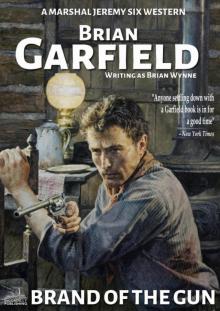 Marshal Jeremy Six #6
Marshal Jeremy Six #6 Marshal Jeremy Six #5
Marshal Jeremy Six #5 The Outlaws 2
The Outlaws 2 Marshal Jeremy Six #7
Marshal Jeremy Six #7 The Lawbringers 4
The Lawbringers 4 Marshal Jeremy Six #4 the Proud Riders
Marshal Jeremy Six #4 the Proud Riders The Romanov succession
The Romanov succession Marshal Jeremy Six #8
Marshal Jeremy Six #8 Sliphammer
Sliphammer Line of Succession
Line of Succession Deep Cover
Deep Cover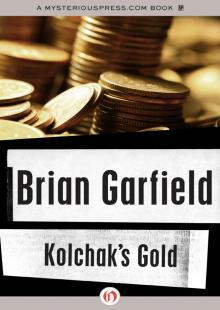 Kolchak's Gold
Kolchak's Gold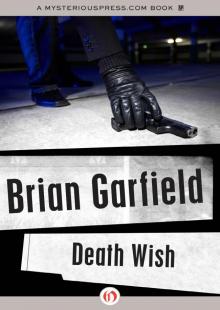 Death Wish
Death Wish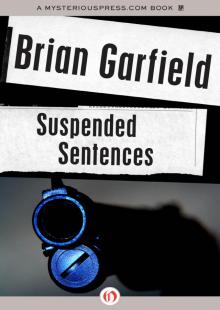 Suspended Sentences
Suspended Sentences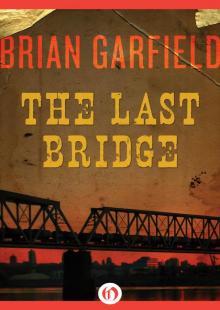 The Last Bridge
The Last Bridge Relentless
Relentless The Vanquished
The Vanquished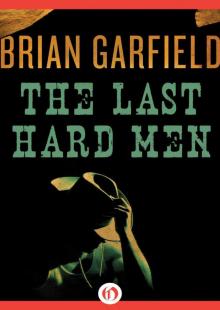 The Last Hard Men
The Last Hard Men Hit and The Marksman
Hit and The Marksman Villiers Touch
Villiers Touch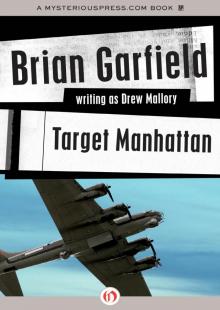 Target Manhattan
Target Manhattan Marchand Woman
Marchand Woman What of Terry Conniston?
What of Terry Conniston? Threepersons Hunt
Threepersons Hunt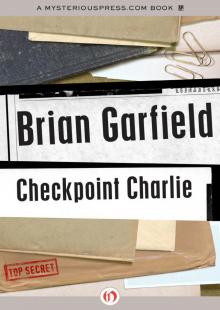 Checkpoint Charlie
Checkpoint Charlie Romanov Succession
Romanov Succession Necessity
Necessity Death Sentence
Death Sentence Fear in a Handful of Dust
Fear in a Handful of Dust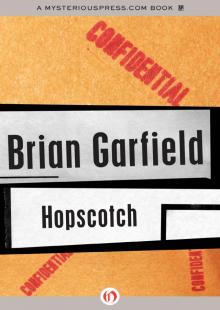 Hopscotch
Hopscotch